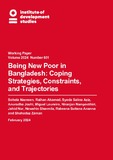| dc.contributor.author | Nazneen, Sohela | |
| dc.contributor.author | Ahamed, Raihan | |
| dc.contributor.author | Aziz, Syeda Salina | |
| dc.contributor.author | Joshi, Anuradha | |
| dc.contributor.author | Loureiro, Miguel | |
| dc.contributor.author | Nampoothiri, Niranjan Jathavedan | |
| dc.contributor.author | Nur, Jahid | |
| dc.contributor.author | Sharmila, Nowshin | |
| dc.contributor.author | Ananna, Rabeena Sultana | |
| dc.contributor.author | Zaman, Shahaduz | |
| dc.coverage.spatial | Bangladesh | en |
| dc.date.accessioned | 2024-03-01T15:54:38Z | |
| dc.date.available | 2024-03-01T15:54:38Z | |
| dc.date.issued | 2024-02-28 | |
| dc.identifier.citation | Nazneen, S. et al. (2024) Being New Poor in Bangladesh: Coping Strategies, Constraints, and Trajectories, IDS Working Paper 601, Brighton: Institute of Development Studies, DOI: 10.19088/IDS.2024.012 | en |
| dc.identifier.issn | 1759-5436 | |
| dc.identifier.uri | https://opendocs.ids.ac.uk/opendocs/handle/20.500.12413/18255 | |
| dc.description.abstract | Recent studies of the Covid-19 pandemic have found that millions in Bangladesh fell into poverty during this time, and they were unable to recover to their pre-pandemic economic position. This study draws on qualitative panel data collected from 39 new-poor households in Khulna, coping with pandemic-induced shocks and attempting to come out of poverty. How are the new poor attempting to recover: what strategies are they using and what constraints do they face? What are the implications for governance of their efforts? Based on their pre-pandemic economic conditions, we divide these new-poor households into two categories: those that were ‘never poor’ and ‘the vulnerable non-poor’ households. All the new-poor households we engaged with used a variety of strategies to cope and recover which included financial strategies such as borrowing money, livelihood strategies such as having multiple occupations, cost-reduction strategies such as decreasing expenditure on health and education, and social safety strategies such as accessing social protection. The main constraints that these households faced were many. These included their inability to access loans and access finances, limited access to social protection, lack of trust and expectations from the local government to provide services to aid their recovery, and social norms around honour and shame which limited their ability to seek assistance or have female members of the household engage in an income-generating activity. Most ‘never-poor’ households were recovering while most of the vulnerable households were stuck. Governance implications of the experiences of these households include the state playing a bigger role in supporting the new poor, limiting the role intermediaries and informal networks play in how social protection is provided, strengthening practices that build trust in local government, and tackling corruption. | en |
| dc.description.sponsorship | Foreign, Commonwealth & Development Office (FCDO) | en |
| dc.language.iso | en | en |
| dc.publisher | Institute of Development Studies | en |
| dc.relation.ispartofseries | IDS Working Paper;601 | |
| dc.rights | The paper is distributed under the terms of the Creative Commons Attribution 4.0 International licence (CC BY), which permits unrestricted use or distribution in any medium, provided the original authors and sources are credited and any modifications or adaptations are indicated. | en |
| dc.rights.uri | https://www.ids.ac.uk/wp-content/uploads/2021/05/Latest_IDSOpenDocsStandardTermsOfUse_CC_BY.pdf | en |
| dc.subject | Governance | en |
| dc.subject | Poverty | en |
| dc.subject | Work and Labour | en |
| dc.title | Being New Poor in Bangladesh: Coping Strategies, Constraints, and Trajectories | en |
| dc.type | IDS Working Paper | en |
| dc.rights.holder | Institute of Development Studies | en |
| dc.identifier.team | Governance | en |
| dc.identifier.doi | 10.19088/IDS.2024.012 | |
| dcterms.dateAccepted | 2024-02-28 | |
| rioxxterms.funder | Default funder | en |
| rioxxterms.identifier.project | Default project | en |
| rioxxterms.version | VoR | en |
| rioxxterms.versionofrecord | 10.19088/IDS.2024.012 | en |
| rioxxterms.funder.project | e4b8632d-62dd-4f31-9936-43860ac26f9a | en |

